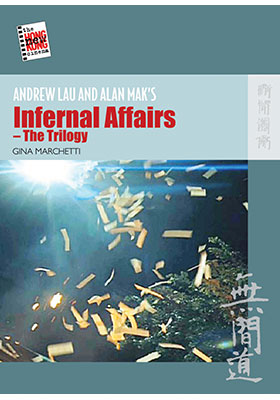Andrew Lau and Alan Mak’s Infernal Affairs—The Trilogy
(劉偉強、麥兆輝的《無間道》系列)
ISBN : 978-962-209-801-5
April 2007
224 pages, 5.5″ x 7.5″, 59 b&w illus.
- HK$195.00
Ebooks
Also Available on
Infernal Affairs has received journalistic, popular and corporate notice but little vigorous critical attention. In this book, Gina Marchetti explores the way this example of Hong Kong’s cinematic eclecticism has crossed borders as a story, a commercial product and a work of art; and has had an undeniable impact on current Hong Kong cinema. Moreover, she uses this trilogy to highlight the way Hong Kong cinema continues to be inextricably intertwined with global film culture and the transnational movie market.
Infernal Affairs served as the source for the Academy Award-winning film The Departed (2006). The Martin Scorsese-directed film won Oscars for best motion picture, director, adapted screenplay and film editing. This is the first time that an American film based on a Hong Kong production swept the Academy Awards by winning four top prizes.
“Although remade by Martin Scorsese, Infernal Affairs still awaits recognition as one of the masterworks of international genre filmmaking. Gina Marchetti’s hugely insightful book calls much-deserved attention to this deceptively complex trilogy, but explicates the multiple levels on which it operates, in particular showing the myriad and subtle ways it draws on the particularities of Hong Kong history and society while at the same time participating in global film movements.” —David Desser, Professor and Director, Unit for Cinema Studies, University of Illinois, Urbana-Champaign
“Gina Marchetti manages quite a balancing act in this book: her analysis of the Infernal Affairs films is rich and detailed, and she very successfully aligns specific narrative tropes with a range of relevant (and complex) issues and concepts, including postmodernity, globalization, surveillance, new technologies, and the construction of identity. At the same time, the discussion is grounded in real-world analogies and examples, which combines with Marchetti’s refreshingly lucid writing to make the book useful and interesting for both film studies scholars and their students.” —Steve Fore, Associate Professor, School of Creative Media, City University of Hong Kong




